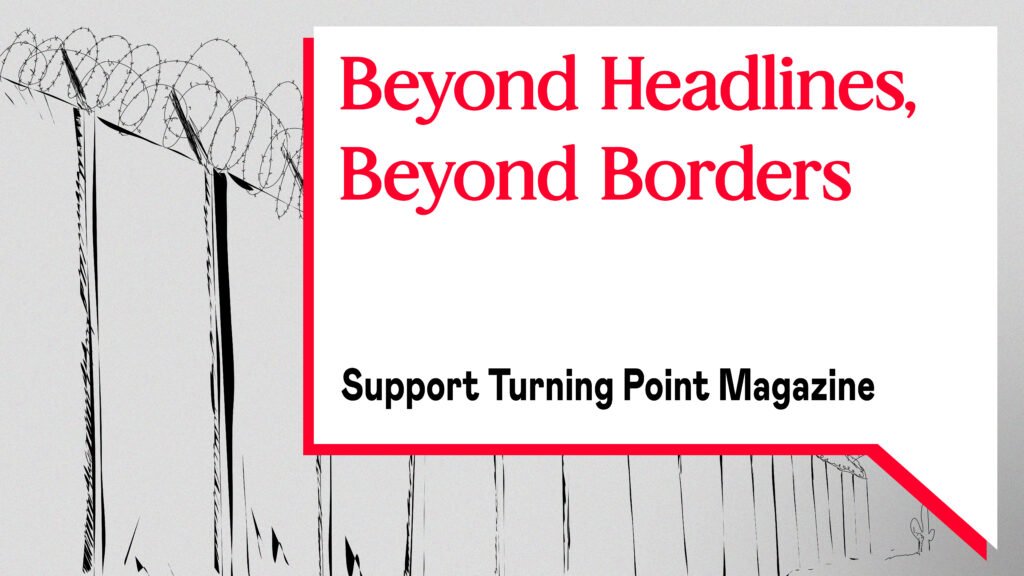Cover photo: Austria, Vienna, February 6, 2024. KPÖ campaign material promoting housing rights. © KPÖ
While we have seen a rightward turn at many European ballot boxes in recent years, there are exceptions. One of the most remarkable examples is the comeback of the Austrian Communist Party (KPÖ). In the 1990s, the party had all but disappeared. There were hardly any elections in the country, from the local to the national level, where it gained even one percent of the vote. Today, the party holds the mayor’s office in Graz, Austria’s second-biggest city, and has delegates in the city councils of Linz, Salzburg, and Innsbruck.
The KPÖ was founded in 1918 on the heels of the Russian Revolution. During the 1920s and 30s, the party enjoyed only limited success and was eclipsed by the Social Democratic Workers’ Party, the predecessor to today’s SPÖ. Led by the Austromarxists hailing from Red Vienna, the Austrian social democrats proved more determined than their counterparts in other countries. Only a few within the workers’ movement saw the need for a party to the left of them.
After the Nazis annexed Austria in 1938, the KPÖ became a leading force in the country’s resistance movement, working closely together with the Yugoslav partisans. After the war, they entered the Austrian parliament, but their credit for the anti-Nazi resistance waned during the post-war economic boom. By 1959, they had lost all their seats. The same happened in most regional and local parliaments.
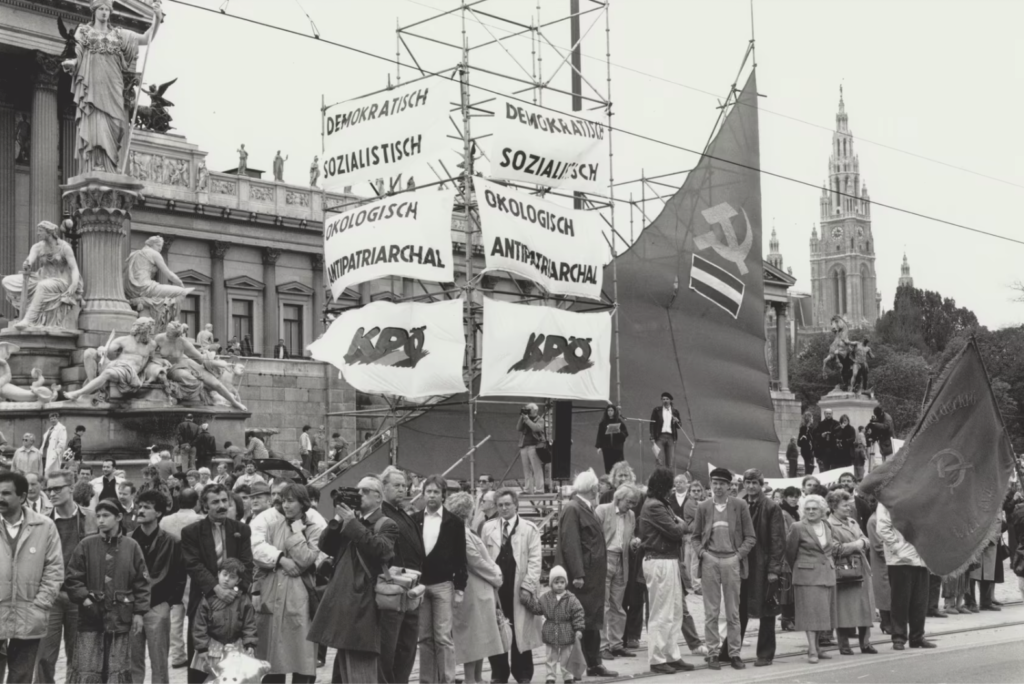
One exception was the city of Graz in the southwest corner of the country. With a viable automobile industry and the Yugoslavian border close by, the KPÖ always received about two percent of the vote in Graz city council elections—enough to secure a seat. In the late 1990s, this seat was held by Ernest Kaltenegger who became a pivotal figure for the KPÖ’s renaissance.
Kaltenegger settled for the average income of a blue-collar worker and donated the rest of his salary (about two thirds) to social projects. He became known as the “man with the bicycle,” constantly making his way around Graz to support the city’s disadvantaged residents. He offered legal advice and financial aid, especially with regard to housing. The result showed at the polls. Within ten years, the KPÖ vote in Graz rose to 20 percent.
Kaltenegger’s successor as the KPÖ chairperson in Graz, Elke Kahr, followed in his footsteps. Kahr, who had been adopted by a working-class family in Graz at the age of three, was the front-runner for the party when it became the city’s strongest in the 2021 elections, securing 29 percent of the vote. Subsequently, Kahr became the city’s first woman mayor, supported by the Green Party and the SPÖ.
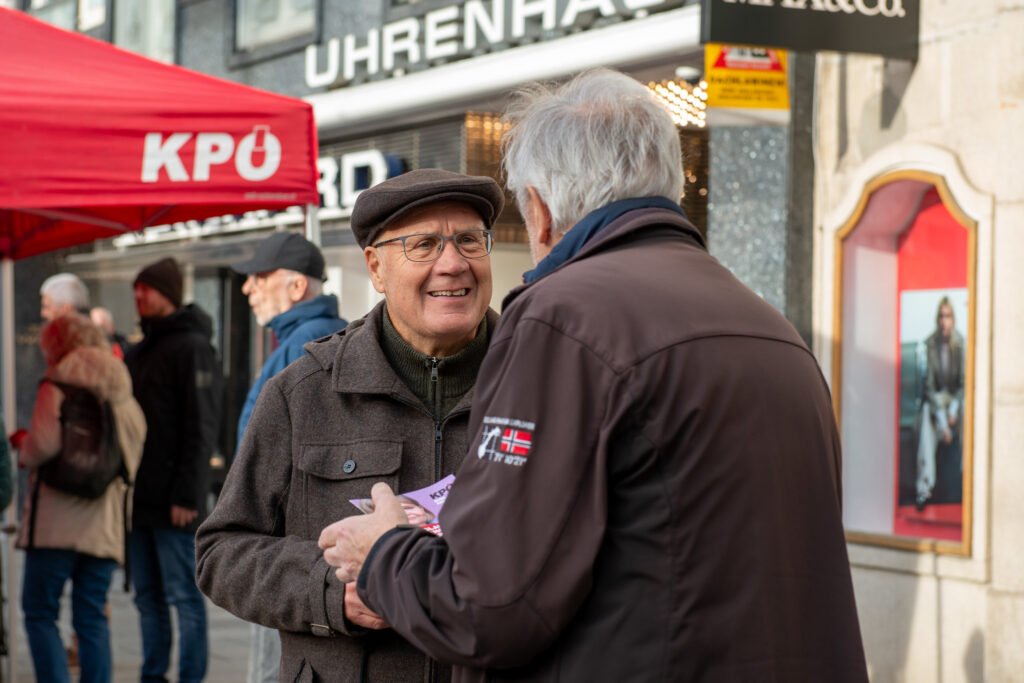
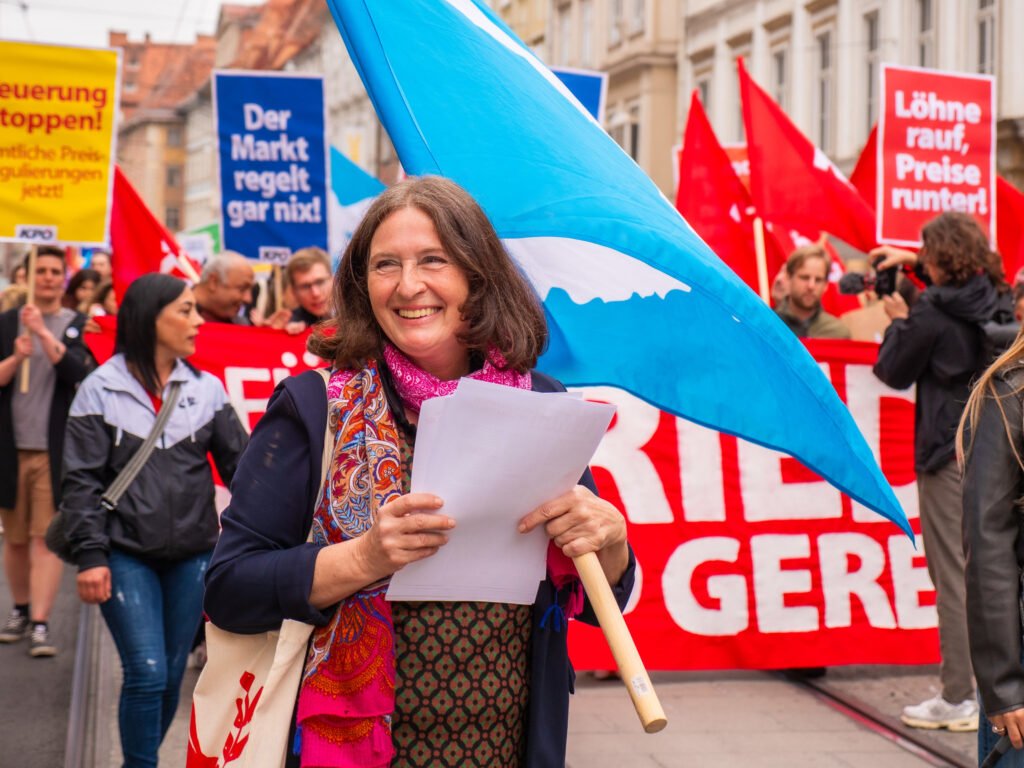
What has changed in Graz since? People in the city often speak of a “new political climate.” As one resident put it in the Austrian daily Der Standard, the “shouting about” in local politics is gone. With the KPÖ at its head, the city government seems interested “in the people, not themselves.” The international City Mayors Foundation seemed to agree with this sentiment when it awarded Kahr the “World Mayor Prize” in 2023, praising her “selfless dedication to her city and its people.”
The translation of a political climate into a new material reality is, of course, a difficult one. There have without doubt been substantial changes in Graz’s social and environmental policies. The website of the KPÖ in Graz lists many of them, from easier access to German-language courses to higher subsidies for homeless shelters and increased funding for the Red Cross. Everyday life, however, hasn’t necessarily changed much for most of Graz’s residents.
Life in the city is still determined by a capitalist economy and bourgeois democracy. It’d be unrealistic to expect anything else. The possibilities of a city council to change fundamental economic and political structures are limited. With regard to the mode of production, they are almost non-existent. And with regard to implementing political decisions, the lawmakers depend on public servants who have often been appointed by their predecessors—in Graz, conservative ones. They can slow down and derail many projects.
Still, the KPÖ achievements in Graz have inspired other KPÖ chapters in the country to adopt its hands-on approach to local politics. In Linz, the country’s third biggest city, the KPÖ returned to the city council in 2009 on the heels of the success in Graz. Among the national KPÖ leadership, however, the developments in Graz were long eyed skeptically. The party members in Graz were accused of populism and engaging in charity rather than class struggle. With each electoral success, however, their position strengthened, especially since the national leadership had little to nothing to show for itself.
The power balance within the party changed significantly when, in 2017, the Green Party expelled the left-wing current of its youth organization due to divergent views about the party’s future. When this current associated itself with the KPÖ, the makeup of the communist party changed. This was particularly palatable in the 2024 city council elections of Salzburg and Innsbruck.
In Salzburg, the KPÖ vote rose from 3,7 percent in 2019 to an astonishing 23,1 percent. Front-runner Kay-Michael Dankl only missed out on the mayor’s office in a runoff election against the social democratic candidate. In Innsbruck, the KPÖ did not even run in the 2018 elections. This year, it captured 6,7 percent of the vote. This is all the more astounding when we consider that Innsbruck is the capital of Tyrol, one of Austria’s historically most conservative regions.
Innsbruck being my hometown, I went there to observe the last week of the municipal election campaign. It was clear how much had changed since I had left the city in the mid-1990s. At the time, the KPÖ was an obscurity eyed with suspicion. Now, it was an accepted contender in local elections that hardly anyone had something bad to say about. Many young people I spoke to were determined to vote for them, many of the older folks said they would consider it, and the SPÖ and Green Party members wished them luck.
The KPÖ campaign in Innsbruck was truly a grassroots effort. The overall budget was 25,000 euros. For comparison, the conservative People’s Party budget was 750,000 euros, that is, thirty times as much. Essentially all campaigning was done by volunteers who had flocked to Innsbruck from all corners of the country, some even from southern Germany. Teenagers with multi-colored hair and piercings worked next to nondescript pensioners, putting up election posters, dropping newspapers in letterboxes, and handing out leaflets.
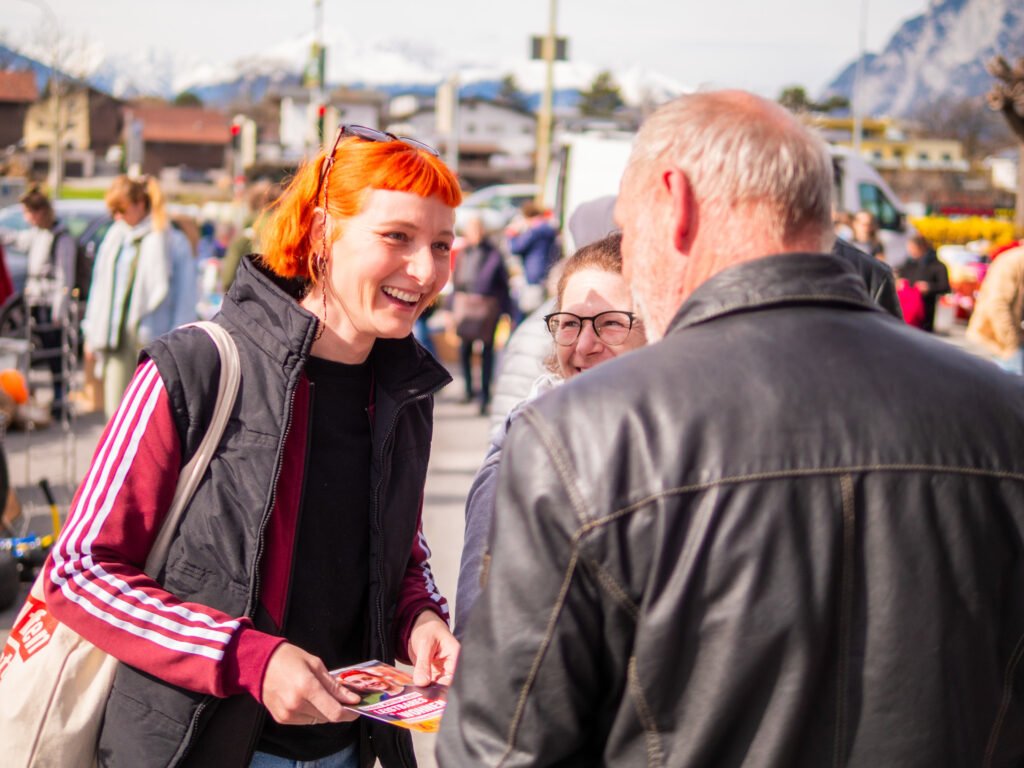
The KPÖ’s front-runner in Innsbruck, the 35-year-old social worker and mother of two Pia Tomedi, followed the Graz model and focused on concrete social issues, especially housing. It was a fitting topic for the city, which has an average rental price of more than 23 euro per square meter – the highest in all of Austria. Posters and leaflets featuring Tomedi usually included a telephone number, allowing those in need to get in touch with her directly.
“Everyone I meet is a potential ally. I don’t mean only comrades but anyone I encounter on the streets. We are all in the same boat, and the boat is about to sink. Together, we can fix it and keep on sailing. Socialism is the goal, social justice the first step,” Tomedi explained her approach to me when I talked with her at her regular campaigning spot, an info table outside of Innsbruck’s biggest shopping center.
The KPÖ doesn’t release statements on geopolitical issues, and it doesn’t engage in debates about communist history. But there is no intention to change the name, even if many political observers believe the party would have even greater success if it just got rid of the communist legacy. Yet, Elke Kahr always has the same answer: “We have nothing to be ashamed of as communists in Austria.”
The fact that the KPÖ does not compromise in its commitment to communism also puts into perspective the critique of radical leftists who believe the party has gone soft and become de facto social democratic. Upholding communism as an ideal, it is unlikely that the KPÖ will turn into a left-liberal enterprise, no matter how hyped it is by millennials more in tune with social media and identity politics than with dialectics and the labor theory of value. There lies, in fact, much potential in the different demographics blending in the KPÖ. This is also reflected in the fact that most of the party’s votes come from disadvantaged neighborhoods on the one hand, and from student and artist quarters on the other.
In the September 2024 national parliament elections in Austria, the KPÖ received 2.39 percent of the vote, not enough to enter parliament for the first time in 65 years. The election result confirmed that the success the party enjoys on a municipal level does not yet translate to the national level. There are various reasons for this, from a lack of prominent front-runners to different priorities among the electorate. In the long term, however, the result is not necessarily a disadvantage for the party. To safeguard the rapid success on the municipal level, the local party chapters still need to be consolidated. It would become a major challenge if the most experienced party representatives were all headed for Vienna, as long-term nationwide success is dependent on the local chapters standing strong.
Gabriel Kuhn
Gabriel Kuhn is an Austrian-born author and union organizer living in Sweden. He has written extensively on working-class history in the German-speaking world.




